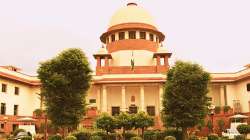Bhima-Koregaon case: SC sets aside Bombay HC order refusing extension of time to file charge sheet
The apex court, however, clarified that since the charge sheet was filed, the accused might now seek regular bail from the trial court, which would decide the pleas on merits and without being influenced by its observations in the present case.

The Supreme Court on Wednesday set aside the Bombay High Court order quashing the 90-day extension granted to the Maharashtra police for filing the charge sheet in the Koregaon-Bhima violence case and held that the accused were not entitled to the "benefit of default bail".
The apex court, however, clarified that since the charge sheet was filed, the accused might now seek regular bail from the trial court, which would decide the pleas on merits and without being influenced by its observations in the present case.
"We are not able to persuade ourselves to agree with the conclusions of the single judge of the Bombay High Court in the impugned order and hold that the respondents would not be entitled to the benefit of default bail and consequently, the impugned order is set aside," a bench of Chief Justice Ranjan Gogoi and justices L Nageswara Rao and Sanjay Kishan Kaul said.
The arrested activists in the case had alleged that they were entitled for grant of default bail as the Maharashtra police had not filed the charge sheet within the stipulated 90-day period and moreover, the 90-day extension granted by the trial court was bad in law.
The Pune police had arrested lawyer Surendra Gadling, Nagpur University professor Shoma Sen, Dalit activist Sudhir Dhawale, activist Mahesh Raut and Kerala native Rona Wilson in June last year for their alleged links with Maoists under the Unlawful Activities (Prevention) Act (UAPA).
The Maharashtra government had filed an appeal in the apex court after the high court had quashed the decision of the trial court extending the time by 90 days to file the charge sheet, saying the public prosecutor "could not be said to have applied his mind" in seeking extension under the UAPA.
Dealing with the legal requirements, Justice Kaul, who wrote the judgment, said the prosecution, while seeking extension of time, had to submit certain issues like it was not possible to complete the probe within the 90-day period and a report had to be filed by the public prosecutor.
The said report indicated the progress of investigation and the specific reasons for detention of the accused beyond the period of 90 days, the court said, adding that the trial court also be satisfied with the report of the prosecutor.
"We are unable to accept the plea advanced on behalf of the respondents (accused) that the material set out in the document does not meet with the requirements of the proviso, insofar as the reasons for seeking extension for the period of investigation are concerned.
"It could not, however, be seriously disputed that the report of the public prosecutor could have been worded better or that if the appellant (state) had approached the court some time earlier, it would have been more appropriate...," the bench said.
The judgment said there was no doubt that the report or application of the public prosecutor, setting out the reasons for extension of 90 days of custody to complete the probe left "something to be desired".
The court rejected the contention of the accused that the procedural infirmities such as filing of two applications by the police officer and then by the prosecutor, seeking extension of time for filing the charge sheet, was fatal.
"There is merit in the contention of the senior counsel for the appellant/state that the question is more of substance than form.... The second document in the form of an application has been filed on the same day. It is not as if the first document, which is an application of the Investigating Officer (IO), was withdrawn to file the second document, which purports to be the report of the public prosecutor," it said.
Undoubtedly, the IO's request for extension of time was not a substitute for the report of the public prosecutor, it added.
There was "an application of mind by the public prosecutor as well as an endorsement by him, the infirmities in the form should not entitle the respondents to the benefit of a default bail, when in substance, there has been an application of mind", the bench said.
Referring to the public prosecutor's report, it said the document set out the development in the probe and conformed to the necessary legal requirements to seek extension of time.
"The developments leading to the incident have also been so set forth. A perusal of the grounds shows that the allegation is that all the respondents are active members of the banned organisation, CPI (Maoist).
"In the course of the investigation, documents, pen drives, CDs, DVDs etc. were seized and the electronic records were sent to FSL, Mumbai for its report, which was still awaited. The data was stated to be voluminous and further investigation was also required into the funding of the accused persons...," the judgment said.
The state police and the prosecutor had filed pleas seeking extension of time by 90 more days for filing the charge sheet on August 30, 2018. The 90-day period was expiring on September 3.
The arrests of the activists had followed raids at their residences and offices in connection with the Elgar Parishad conclave held in Pune on December 31, 2017, which, the police had claimed, had led to violence at Koregaon-Bhima the next day.
Under the UAPA, a charge sheet must be filed within 90 days of arrest. However, the prosecutor can file a report before the trial court, explaining the reasons for the delay and seek more time. If satisfied, the court can extend the time by 90 more days.
